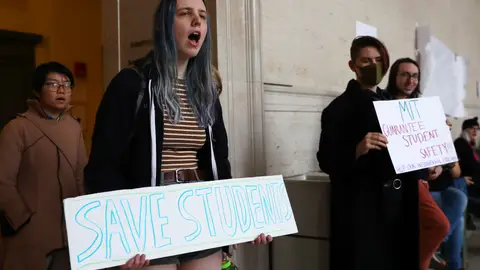The Senate's New Coronavirus Bill Will Extend Student Debt Relief Until September

After days of deliberations and one stalled vote, the United States Senate passed a stimulus plan that will aim to support the American economy as it weathers the spread of the novel coronavirus, and the social distancing and self-isolation techniques that entire states have put into place in an effort to slow contagion rates. At $2 trillion, it's more than double the $831 billion stimulus bill which the Obama administration passed in 2009 and dwarfs the multiple efforts made by the Bush administration after 9/11 and the housing crisis and subsequent market collapse of 2008.
While Trump is already touting the sheer size of this bill, it's worth keeping in mind that this pandemic is an unprecedented crisis: The problem is bigger, so the response will naturally need to be bigger, too. At least 3 million people filed unemployment claims the week of March 16, which the New York Times points out is the biggest number of new claims the country has seen in modern history. (The last record was 695,000 new claims in a single week in October 1982, at the tail end of the 1981-1982 recession.) It's unclear how that number will change in the coming weeks, not least of all because plenty of people are experiencing issues connecting with their state's unemployment office. That data may not reflect people who are self-employed and have had clients or gigs canceled, or who are still employed part-time and have seen a reduction in working hours or pay. According to a poll from student advocacy group Rise, 52 percent of college-aged respondents said their work had been impacted as a result of the pandemic.
That's why the Senate bill, called the Coronavirus Aid, Relief, and Economic Security (CARES) Act, allocates around $250 billion to distribute one-time checks to American adults and their children, with some provisions. The checks will cap at $1,200 and will be based on the most recent tax filings: Those who make up to $75,000 as a single person qualify for the full amount, while couples who make up to $150,000 will qualify for $2,400 total. Households with children will receive an additional $500 per child.
But that one-time check likely won't go far for a lot of people, who are worried about being out of work for the foreseeable future. To that effect, the Senate bill will provide an additional $600 a week for people who have qualified for unemployment, for up to four months. Those benefits will extend to self-employed and part-time workers, which typically doesn't happen, as well as gig workers and furloughed workers. Those funds are on top of whatever unemployment assistance is provided for by the state; if you have been impacted by a recent COVID-19 related layoff, you can click here for help on how to apply for benefits.
The bill also sets aside money for emergency financial aid to both colleges and students, who will receive at least half of the funds provided to their institutions. The bill mandates that institutions use "no less 15 than 50 percent of such funds to provide emergency financial aid grants to students for expenses related to the disruption of campus operations due to coronavirus (including eligible expenses under a student’s cost of attendance, such as food, housing, course materials, technology, health care, and child care)."
This comes after many schools mandated that students move out of their dorms for the remainder of the semester, sometimes without providing adequate messaging or support to international students or those without the immediate means to secure their way home. An estimated 18 percent of students nationwide do not have reliable internet or computer access at home, and one in three students told Rise they now lack access to a reliable source for healthy food.
While the bill will allow for up to six months' deferment on federal student loan payments, it does not provide widescale student debt relief. Unlike the previous promise by the Department of Education, these federal loan deferments should kick in automatically, and last until September 30. The bill also stipulates that interest will not accrue during this six-month period.
The House of Representatives has yet to vote on the bill; they are set to cast votes on Friday (March 27). If the CARES Act passes, it will take at least a few weeks for checks and other relief to start rolling out to people. But a new month is fast approaching, and plenty of people are worried about paying rent on April 1. (Only one in three young people own their homes; the vast majority of people aged 25-30 rent.) Curbed notes that a number of cities have issued eviction moratoriums, but not outright forgiveness, which means that renters may be at risk of eviction when the grace period is up. As a result, people are lobbying their state lawmakers to pass more comprehensive legislation, and also rallying together to create mutual aid funds to help those in need.





